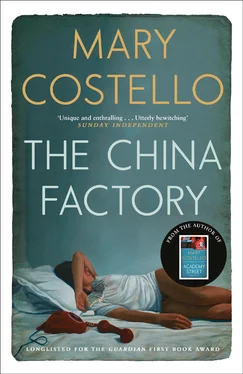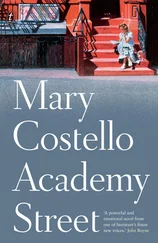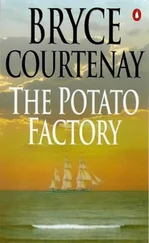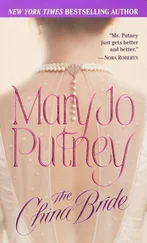Mary Costello - The China Factory
Здесь есть возможность читать онлайн «Mary Costello - The China Factory» весь текст электронной книги совершенно бесплатно (целиком полную версию без сокращений). В некоторых случаях можно слушать аудио, скачать через торрент в формате fb2 и присутствует краткое содержание. Год выпуска: 2015, Издательство: Canongate Books, Жанр: Современная проза, на английском языке. Описание произведения, (предисловие) а так же отзывы посетителей доступны на портале библиотеки ЛибКат.
- Название:The China Factory
- Автор:
- Издательство:Canongate Books
- Жанр:
- Год:2015
- ISBN:нет данных
- Рейтинг книги:5 / 5. Голосов: 1
-
Избранное:Добавить в избранное
- Отзывы:
-
Ваша оценка:
- 100
- 1
- 2
- 3
- 4
- 5
The China Factory: краткое содержание, описание и аннотация
Предлагаем к чтению аннотацию, описание, краткое содержание или предисловие (зависит от того, что написал сам автор книги «The China Factory»). Если вы не нашли необходимую информацию о книге — напишите в комментариях, мы постараемся отыскать её.
In these twelve haunting stories award-winning writer Mary Costello examines the passions and perils of everyday life with startling insight, casting a light into the darkest corners of the human heart.
The China Factory — читать онлайн бесплатно полную книгу (весь текст) целиком
Ниже представлен текст книги, разбитый по страницам. Система сохранения места последней прочитанной страницы, позволяет с удобством читать онлайн бесплатно книгу «The China Factory», без необходимости каждый раз заново искать на чём Вы остановились. Поставьте закладку, и сможете в любой момент перейти на страницу, на которой закончили чтение.
Интервал:
Закладка:
She stood on the pier until he swam back in. That night in the cottage, with the lamps lit and the radio on, they cooked a long slow meal and drank wine and listened to the waves crashing on the rocks. She had not thought of the child for hours. She closed her eyes for a second. We are here, now , she thought. We have come through it .
Emily woke that night, crying. David lifted her into their bed. Water dripped from the ceiling into a bucket. It was 3am, the dead of night. The hearse was moving across the country, its headlights cutting a tunnel through the dark. Soon it would round a bend and the dark bulk of Croagh Patrick would loom over it.
‘Sleep,’ David whispered. ‘Sleep… It will all be over tomorrow.’
She listened for the plop of each drop in the bucket. She knew now that Matt’s stamp on her was permanent. She dozed off and fell into a dream. A phone was ringing in an empty house. It rang for a long time and when she picked up, it was Matt, calling from abroad. There was static on the line, followed by little blips, like Morse code. Then his voice broke through. ‘Guess who died?’ he said.
The weather held all day. In the church the priest said Matt’s name over and over. Paul read from the Scriptures and a fiddler played a slow air. In the front pew his mother and sisters sat still and upright. Behind them Paul, with a back like Matt’s, sat next to his wife Anna and their teenage sons. The coffin of Lebanese cedar was ten feet away. She could feel his closed eyes watching her. A shaft of sunlight fell through a high window and hit the head of the priest, and dust particles floated down from the raised Host. She tilted her head, and followed the slanting ray of sun, and a memory rushed in of a day — an evening — in autumn, eighteen months after Charlie’s death. Some instinct had prompted her to take a walk, and down the street, the sun disappeared and she felt drops of rain on her head, but forced herself on, because every small triumph counted in those days. But then the drops came heavier and she turned and hurried back to the house. At the front window she stood for a moment and looked in. He was sitting on the couch talking on the phone, and just the sight of him restored her. Then she tapped the glass with her fingernail to startle him — no, surprise him — with her unexpected return. He jumped up in panic and dropped the phone into its cradle. She stepped back onto the grass and crushed a snail underfoot.
‘Who were you calling?’
‘No one. I wasn’t calling anyone.’ She saw the gold flecks in his eyes and they were jumping.
When he went out she pressed the redial button. A woman answered, ‘Hello.’ And again, ‘Hello.’ In the background there were children, a TV, a kitchen maybe. Ruth hung up and redialled and the woman on the other end was silent.
There were other signs too, that made her insides quicken, and eventually she knew he wanted to be found out. He showed no remorse. She, Ruth, had grown distant. He had felt her silent blame every day — with her dead eyes she had accused him. For months she did nothing — she could not countenance being without him. Then, when the woman in the kitchen began to call and calmly ask for him by name, Ruth left.
The congregation stood and there was a rattle of chains, and a cloud of incense rose to the roof. The coffin was wheeled outside and they walked behind it down the hill to the graveyard. Was it Solomon’s chariot that was fashioned from cedar wood? Was it the cedars of Lebanon that wept? She pictured his house back in the city — bills on the table, dishes in the sink, his bike in the hall. She thought his death had imperilled her, too. She thought how its timing had hovered over him, hidden from him. How he had risen each morning for weeks, months, years and moved through each day and lain down each night, but the countdown had begun — he was already hurtling towards this moment, as she was towards hers.
Flocks of seagulls circled and shrieked above the grave as the mourners gathered close. The waves lapped on the shore and the murmur of the Rosary rose and fell and enclosed her. Across the open grave Paul’s head was bowed, a son on either side of him. She closed her eyes. She should not have come. She should not have listened out for Matt’s echo, or let him summon her here like this.
In the distance the church bell rang and she looked up and saw Anna with tears slipping down her face, and she was thrown. Their eyes met and lingered for a second, and Ruth, feeling herself weaken, searched Anna’s face for a moment and then the face of the woman next to her, and then slowly, abstractedly, face by face, other random women in the crowd. She might be here, she thought, the woman in the kitchen with the TV on, might be here. I might have always known her. I might have walked down the hill beside her now. She peered at each woman’s face. Is it you? she mouthed across the grave. Or you? Or you?
And then something on the edge of Anna moved. Her son’s arm dropped by his side. Ruth shifted her gaze to his face. Paul Junior, the second son. He had been a small boy when she knew him, seven or eight, no more. Now he had the thin face and raw features of a mid-teen, before the bones are properly scored or perfected. He is still in the making, she thought — and she began to study his face and eyes and body for some resemblance to Matt, or for how the child might one day have looked, or borne himself. The boy was staring straight ahead. Then his eyelids flickered and his eyes rolled back, and a damp patch appeared and spread down the front of his trousers. He fell to the ground heavily and his head hit the edge of the grave. Paul and Anna dropped to their knees beside him and the priest stumbled in his prayer and paused. And then the boy’s limbs stiffened and jerked and his whole body began to vibrate. His teeth clenched and his face beat against the clay. Paul half-stood and signalled to the priest — a look of reassurance and a plea to continue. Then he bent and laid a hand on his son’s convulsing back, and waited. A hush descended on the mourners and the priest’s words were barely audible. The boy’s body shook and thrashed and Ruth stood paralysed, caught in its hazard, as if wired to the boy and his tender taut brain, as if the neurons that misfired and hurled through him were escaping and crossing and alighting on her and she, too, would be felled in this neurological strike.
Then the storm passed. The thrashing eased and his limbs slowly stilled. Ruth held her breath. For a few seconds all was quiet and she felt a part of her shift, lighten, enter a new dimension. She had a vague sensation of Matt’s nearness. She saw the boy, foetal, on the ground. His completion had been interrupted, logic and memory momentarily wiped out. Scorch marks left on a delicate cerebral membrane. He opened his eyes and raised his head and Paul and Anna lifted him up and he stood pale, dazed, resurrected. The crowd stepped back and the three of them, stooped and leaning into each other like one body, sleepwalked away.
The mourners closed in and the priest started up again. Out on the road she glimpsed Paul open a car door. She imagined the three of them in the back seat, Paul Junior in the middle, a hand from each side touching him, earthing him again. His absence now left her more deeply alone. The priest intoned the prayers and the mourners responded louder and harder than ever, and the coffin was lowered into the grave. She watched it disappear. Her only link to the child was going too. Holy Mary, Mother of God, pray for us sinners . The volume shocked her. Now and at the hour . A day would come when there would be no trace of Matt left, either. Clods of earth fell on the lid and she looked up at the sky and became, suddenly, bereft. Once, their eyes had ached for each other. Their hearts had chimed. In one another’s silence they had known joy and loneliness, in equal measure. In the end he had accelerated away from the reach of grief, and from his own unfathomable self. What he had done, his betrayal, was not unforgiveable. She knew then it was easier to be the one hurt, than the hurter.
Читать дальшеИнтервал:
Закладка:
Похожие книги на «The China Factory»
Представляем Вашему вниманию похожие книги на «The China Factory» списком для выбора. Мы отобрали схожую по названию и смыслу литературу в надежде предоставить читателям больше вариантов отыскать новые, интересные, ещё непрочитанные произведения.
Обсуждение, отзывы о книге «The China Factory» и просто собственные мнения читателей. Оставьте ваши комментарии, напишите, что Вы думаете о произведении, его смысле или главных героях. Укажите что конкретно понравилось, а что нет, и почему Вы так считаете.












